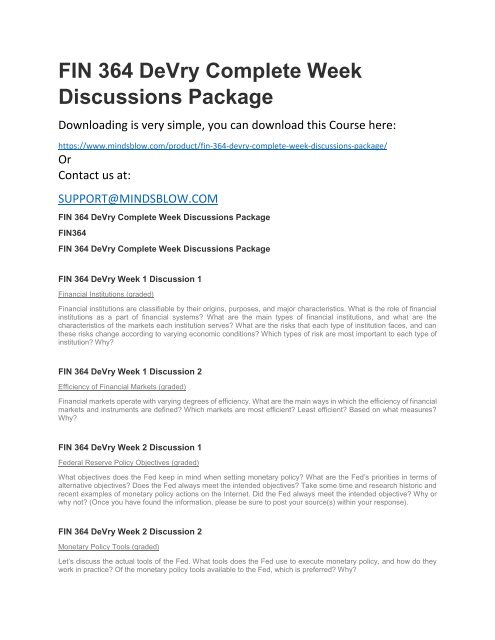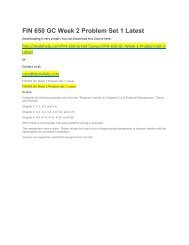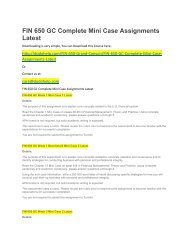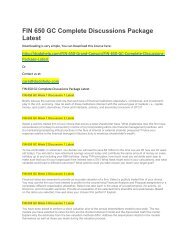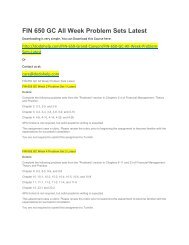FIN 364 DeVry Complete Week Discussions Package
Create successful ePaper yourself
Turn your PDF publications into a flip-book with our unique Google optimized e-Paper software.
<strong>FIN</strong> <strong>364</strong> <strong>DeVry</strong> <strong>Complete</strong> <strong>Week</strong><br />
<strong>Discussions</strong> <strong>Package</strong><br />
Downloading is very simple, you can download this Course here:<br />
https://www.mindsblow.com/product/fin-<strong>364</strong>-devry-complete-week-discussions-package/<br />
Or<br />
Contact us at:<br />
SUPPORT@MINDSBLOW.COM<br />
<strong>FIN</strong> <strong>364</strong> <strong>DeVry</strong> <strong>Complete</strong> <strong>Week</strong> <strong>Discussions</strong> <strong>Package</strong><br />
<strong>FIN</strong><strong>364</strong><br />
<strong>FIN</strong> <strong>364</strong> <strong>DeVry</strong> <strong>Complete</strong> <strong>Week</strong> <strong>Discussions</strong> <strong>Package</strong><br />
<strong>FIN</strong> <strong>364</strong> <strong>DeVry</strong> <strong>Week</strong> 1 Discussion 1<br />
Financial Institutions (graded)<br />
Financial institutions are classifiable by their origins, purposes, and major characteristics. What is the role of financial<br />
institutions as a part of financial systems? What are the main types of financial institutions, and what are the<br />
characteristics of the markets each institution serves? What are the risks that each type of institution faces, and can<br />
these risks change according to varying economic conditions? Which types of risk are most important to each type of<br />
institution? Why?<br />
<strong>FIN</strong> <strong>364</strong> <strong>DeVry</strong> <strong>Week</strong> 1 Discussion 2<br />
Efficiency of Financial Markets (graded)<br />
Financial markets operate with varying degrees of efficiency. What are the main ways in which the efficiency of financial<br />
markets and instruments are defined? Which markets are most efficient? Least efficient? Based on what measures?<br />
Why?<br />
<strong>FIN</strong> <strong>364</strong> <strong>DeVry</strong> <strong>Week</strong> 2 Discussion 1<br />
Federal Reserve Policy Objectives (graded)<br />
What objectives does the Fed keep in mind when setting monetary policy? What are the Fed’s priorities in terms of<br />
alternative objectives? Does the Fed always meet the intended objectives? Take some time and research historic and<br />
recent examples of monetary policy actions on the Internet. Did the Fed always meet the intended objective? Why or<br />
why not? (Once you have found the information, please be sure to post your source(s) within your response).<br />
<strong>FIN</strong> <strong>364</strong> <strong>DeVry</strong> <strong>Week</strong> 2 Discussion 2<br />
Monetary Policy Tools (graded)<br />
Let’s discuss the actual tools of the Fed. What tools does the Fed use to execute monetary policy, and how do they<br />
work in practice? Of the monetary policy tools available to the Fed, which is preferred? Why?
<strong>FIN</strong> <strong>364</strong> <strong>DeVry</strong> <strong>Week</strong> 3 Discussion 1<br />
Loanable Funds and Interest Rates (graded)<br />
Let’s discuss the relationship between loanable funds and interest rates. What are the sources of loanable funds in the<br />
economy? How does the availability of loanable funds affect interest rates? What does this imply for the way in which<br />
the Fed manages the money supply?<br />
<strong>FIN</strong> <strong>364</strong> <strong>DeVry</strong> <strong>Week</strong> 3 Discussion 2<br />
Expectations and Interest Rates (graded)<br />
What is the role of expectations in interest rate determination? How does expectations affect real and nominal interest<br />
rates? How and why do lenders make interest rate adjustments? How does this affect borrowers?<br />
<strong>FIN</strong> <strong>364</strong> <strong>DeVry</strong> <strong>Week</strong> 4 Discussion 1<br />
Bonds and Bond Duration (graded)<br />
Suppose you have a goal of starting a new business 3 years from now and must accumulate enough funds for this<br />
project. You decide to invest in bonds, but are concerned about interest rate risk. How can duration be used to estimate<br />
and manage interest rate risk? How can the duration of a bond portfolio be adjusted? Why might an institution or<br />
investor want to do this?<br />
<strong>FIN</strong> <strong>364</strong> <strong>DeVry</strong> <strong>Week</strong> 4 Discussion 2<br />
Bond Characteristics and Behavior (graded)<br />
How are bond prices related to interest rates? What are the impacts of tax treatments; marketability; and characteristics<br />
such as call provisions, put options, and conversion options on yield? Given your earlier answer, what are the<br />
characteristics of an ideal bond from an investor’s perspective?<br />
<strong>FIN</strong> <strong>364</strong> <strong>DeVry</strong> <strong>Week</strong> 5 Discussion 1<br />
Money Market Instruments in Detail (graded)<br />
You are the CEO of a Fortune 500 company. You have two objectives:<br />
1. invest $5 million cash on hand short term (overnight to one month); and<br />
2. borrow $100 million for your firm’s working capital needs.<br />
How would you achieve both objectives using the money markets? Describe your alternatives in terms of the<br />
characteristics of money markets instruments. Which of the money market instruments would you choose in each case?<br />
Why?<br />
This section lists options that can be used to view responses.<br />
<strong>FIN</strong> <strong>364</strong> <strong>DeVry</strong> <strong>Week</strong> 5 Discussion 2<br />
Repos and Repo Transactions (graded)<br />
What are repos? How popular are they as a money market instrument compared to other money market options? Under<br />
what circumstances does engaging in a repo transaction makes sense? How important are expectations to the repo<br />
transaction?
<strong>FIN</strong> <strong>364</strong> <strong>DeVry</strong> <strong>Week</strong> 6 Discussion 1<br />
Securitizing Debt (graded)<br />
What are the key things to consider when considering securitizing consumer debt such as auto loans or credit card<br />
debt? Should we trust the securitization of other loans such as mortgage notes? Why are these issues important? What<br />
is the role of guarantees in the securitization process?<br />
<strong>FIN</strong> <strong>364</strong> <strong>DeVry</strong> <strong>Week</strong> 6 Discussion 2<br />
Using Capital Markets (graded)<br />
Capital markets can involve both large corporations and investors seeking long term investment options. Under what<br />
circumstances are capital markets appropriate for use by a large firm raising capital? Which capital markets instruments<br />
would be preferred by such a borrower? Why? And, should investors consider investing in instruments based in<br />
emerging markets? What are the risks?<br />
<strong>FIN</strong> <strong>364</strong> <strong>DeVry</strong> <strong>Week</strong> 7 Discussion 1<br />
Agency Debt (graded)<br />
How do agencies such as Fannie Mae and Freddie Mac allow individual mortgage holders to collectively benefit from<br />
the agencies’ access to the capital markets? Does this access result in lower mortgage rates than would otherwise be<br />
the case? Are consumers able to have greater access to mortgage opportunities? Why or why not?<br />
<strong>FIN</strong> <strong>364</strong> <strong>DeVry</strong> <strong>Week</strong> 7 Discussion 2<br />
Mortgages and Mortgage-Backed Securities (graded)<br />
Who are the typical holders of mortgages and mortgage-backed securities? What characteristics of mortgage-backed<br />
securities make them attractive to these entities? What entities are involved in the origination of mortgages and the<br />
exchange of mortgage-backed securities, and how can industry conditions impact these markets?


